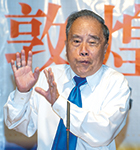SGI President Daisaku Ikeda publishes a peace proposal each year exploring the intricate relation between core Buddhist concepts and the diverse challenges global society face in the effort to realize peace and human security. These proposals discuss issues such as nuclear disarmament, sustainable living, human security, and other crucial topics related to building a peaceful global community.
COSMIC features some of SGM youths being inspired by the Peace Proposal and contributing to society, as well as testimonials from people of insight.
- Opening the Door to the World – Sow Yi Wen
- Inspiration for a Contributive Life – Cai May Tan
- Peace Proposals Empower My Life – Andreanna Ten
- Daisaku Ikeda’s philosophy of peace is more needed now – Dr. Lai Kuan Fook
* * *
Opening the Door to the World

Yi Wen studied international relations at Nanjing University, China and Nanyang Technological University, Singapore. He is currently a research assistant at the University of Malaya. He was an active member of the SGM Selangor student division and hopes to become a university lecturer in the future, aspiring to widely share President Ikeda’s peace ideals and sow the seeds of peace in the hearts of university students.
I first learnt about the Peace Proposals as a SGM student division (SD) member between 2005 and 2007. Seniors in the youth division led us to study the proposals and we shared our views.
I found the ideas in the proposals intriguing but hard to understand. However, a senior said that, “If you read them ten times, you’ll begin to understand.”
I followed this advice and gradually I began to understand the contents and President Ikeda’s ideals, and what people can do to achieve world peace.
After sharing the Peace Proposals, I felt I learnt more about my mentor and world peace. I began reading the proposals each year, and helped foster successive generations of SD members through sharing these proposals.
The issue I find most interesting is the abolition of nuclear weapons. Though it’s a difficult issue, it lies at the core of the proposals. Each year, President Ikeda would call for the prohibition of nuclear weapons, whether it’s through treaties such as the Treaty on the Non-Proliferation of Nuclear Weapons (NPT), the Comprehensive Nuclear- Test-Ban Treaty (CTBT) and the Treaty on the Prohibition of Nuclear Weapons (TPNW), or calling on the United Nations, leaders of nations and ordinary people to stop using these weapons.
If nuclear weapons, or the idea of using nuclear weapons, exist, then world peace is still far away.
Studying the Peace Proposals as a student ignited my interest in current affairs and international relations, enabling me to better understand how the world works. This led me to pursue a master’s in international relations to further understand the complexity of global affairs in relation to the proposals’ content. It also put me on the path of my dream of becoming an academician who shares President Ikeda’s peace ideals with my students.
The proposals are written for people such as UN officials, academicians and intellectuals, and its contents are profound, covering topics such as literature, philosophy, international relations, history and sociology.
Each Peace Proposal leads to new discoveries, and to me pondering various viewpoints. This is an important step in developing wisdom. Through continuous studying, questioning and debating, I am stimulated. President Ikeda’s expansive life-state is one that I aspire to.
* * *
Inspiration for a Contributive Life
 Cai May is a climate solutions professional. She is a Senior Programme Officer at Verra, which is a standard- setting body for climate and sustainable development programmes. She supports the development of greenhouse gas quantification methodologies and reviews carbon offset projects. Currently, Cai May is based in Arlington, Virginia in the US.
Cai May is a climate solutions professional. She is a Senior Programme Officer at Verra, which is a standard- setting body for climate and sustainable development programmes. She supports the development of greenhouse gas quantification methodologies and reviews carbon offset projects. Currently, Cai May is based in Arlington, Virginia in the US.
I first heard about President Ikeda’s Peace Proposals in a high school division meeting. I was curious from the start: How does anyone begin to solve the world’s biggest problems? What are the concrete solutions to achieve peace? A few years later in 2010, there was a call for speakers to present President Ikeda’s Peace Proposal. As an active member of SGM’s Hope Fife-and-Drum Corps then, where we aimed to become an “Angel of Peace,” I was exploring the concept of peace and embodying it in everyday life, so it was a natural decision to be a part of the presenting cohort.
My favourite topic that President Ikeda discusses is promoting sustainable development as a means to contribute to peace, as peace extends beyond the absence of war and nuclear weapons, to encompass improving living conditions. The first time I learned about sustainable development was when President Ikeda referenced the Millennium Development Goals as an example of global cooperation.
Looking back, it was really striking that President Ikeda was already a proponent of sustainable development before the Sustainable Development Goals (SDGs) were on everybody’s agenda. The topic is closely related to SGM’s values on promoting peace, culture and education as key ways to change lives and inspire hope. It the best way to embody peace in our daily lives.
Having learnt about the Peace Proposals, I was inspired to live a contributive life. I didn’t have clear career ambitions, but I knew I wanted to work within the sustainable development realm on a global scale. In college, I discovered my passion in environmental sciences and climate mitigation. Climate change is arguably the biggest problem of the 21st century and we are already seeing conflicts arising over the depletion of natural resources, the increased frequency of extreme weather events, the displacement of people, the instability of food production systems, and more.
I knew I was on the right track because the main environmental issues today are inherently linked to peace, not to mention, environment is a key pillar of sustainable development. Fast forward, I am now a climate solutions professional at a global non-profit which channels finance to climate mitigation and sustainable development activities. The Peace Proposals helped me establish my life’s principles and gave me the tools to choose the best way I can add value to society.
* * *
Peace Proposals Empower My Life
 Since her student days, Andreanna has attended various programmes related to sustainable development, such as the Earth Charter Plus 10 Conference in India (2010) and the ASEAN Youth Eco-Leaders Volunteer Programme in Malaysia and the ASEAN-India Student Exchange Programme (2013). She also volunteered with the United Nations High Commissioner for Refugees Malaysia as part of her legal aid duties during her pupillage in 2015. She is currently a partner at a well-known Malaysian law firm and is based in the Klang Valley.
Since her student days, Andreanna has attended various programmes related to sustainable development, such as the Earth Charter Plus 10 Conference in India (2010) and the ASEAN Youth Eco-Leaders Volunteer Programme in Malaysia and the ASEAN-India Student Exchange Programme (2013). She also volunteered with the United Nations High Commissioner for Refugees Malaysia as part of her legal aid duties during her pupillage in 2015. She is currently a partner at a well-known Malaysian law firm and is based in the Klang Valley.
I first became aware of President Ikeda’s Peace Proposals through high school division activities. I was asked to be a speaker for a Peace Proposal Forum in Selangor organised by the student division there.
I was preparing to discuss nuclear weapons and environmental sustainability. Our panel of speakers learnt a great deal in terms of depth and breadth on the topics. From a young age, I was impressed upon the depth of world issues and the importance for youth to step up and tackle these issues.
It is a common perception that we cannot contribute much to the larger movement for world peace (be it for environmental sustainability or nuclear weapons abolition) on an individual level. Such perception however leads to non-action on our part, which is akin to being silent in the face of evil and thus allowing evil to flourish.
Hence, the concept from the Peace Proposals that I’ve kept closest to my heart is that we should not underestimate the impact of one person’s actions or efforts in working towards world peace, as such individuals, when banded together, are capable of creating ripples in a body of calm water. This is truly empowering, especially when we feel that we are too small to shape or influence global events (such as the war in Ukraine) or even events in our own lives.
President Ikeda’s Peace Proposals have influenced me in a several ways. Firstly, I am always mindful to seek non-conflict resolutions in dealing with difficult clients or counterparties. Where there appears to be a difficult relationship (whether with clients or colleagues), my first instinct now is to engage them on a deeper level and to understand their perspective.
For example, there was this client of my team whom every senior hated and always had difficulty engaging with. However, through non-conflict resolutions and deeper dialogues with her, I have managed to transform my relationship with the client to one of mutual respect and friendship.
Secondly, I am always empowered to take on challenges. Non-action is not acceptable, as even a decision to stay silent is a form of action. Instead of thinking “Am I really capable enough to do this?” President Ikeda’s Peace Proposals have shaped my thought process to be that of “How should I go about this to make it work?”
Thirdly, my worldviews on a macro level have also been influenced by President Ikeda’s Peace Proposals, whereby I am conscious of world peace efforts and I work towards environmental sustainability. Such interest and efforts in global affairs would not have been cultivated had I not participated in President Ikeda’s Peace Proposal presentations since my student days.
* * *
Daisaku Ikeda’s philosophy of peace is more needed now
 Dr. Lai Kuan Fook graduated from Chung Ling Private High School and National Taiwan Normal University, and got a master’s degree from Indiana University and a doctor’s degree in education from Cambridge. He used to be the assistant editor of Kwong Wah Yit Poh, the head of the Chinese Department of Universiti Teknologi MARA (UiTM), participated in politics, and served as a consultant in many societies. His research scope covers Buddhism, Confucianism, I Ching, culture, history, folk customs, etc. He is also the co-editor of A New History of Malaysian Chinese.
Dr. Lai Kuan Fook graduated from Chung Ling Private High School and National Taiwan Normal University, and got a master’s degree from Indiana University and a doctor’s degree in education from Cambridge. He used to be the assistant editor of Kwong Wah Yit Poh, the head of the Chinese Department of Universiti Teknologi MARA (UiTM), participated in politics, and served as a consultant in many societies. His research scope covers Buddhism, Confucianism, I Ching, culture, history, folk customs, etc. He is also the co-editor of A New History of Malaysian Chinese.
Dr. Lai has given a lecture at Wisma Kebudayaan SGM in 2014, and was also invited to give a keynote address in support of Soka Gakkai Malaysia (SGM) and Daisaku Ikeda’s peace ideals for the “Peace proposal” event held by SGM Selangor Branch.
The ongoing war in Ukraine makes me feel that Daisaku Ikeda’s claim needs more attention.
A few days ago, on the anniversary of the end of World War II (August 15th), Japanese Prime Minister Fumio Kishida delivered a speech at the memorial ceremony, reaffirming his commitment to “no more war”.
However, the Ukraine war shows the threat that the world may face at any time. In particular, many big countries have nuclear weapons in their arsenals, which is very dangerous. Fortunately, the leaders of various countries have restrained themselves. If they can’t restrain themselves, everyone will go to war for their own interests. Once a nuclear war breaks out, countries will retaliate with nuclear weapons, and the fate of mankind will be unimaginable.
At such a moment, the Peace Proposal published by Daisaku Ikeda every year is even more important and necessary today, and it must be taken seriously.
I believe that countries with nuclear weapons must have the wisdom to make any decisions on the premise of “humanity is the only family”. As leaders of such big nations, you must have wisdom and compassion.
At a time when peace is threatened, Mr. Ikeda’s dedication to his 40 years of advocacy is more than evident and is truly praiseworthy.
Adapted from the September 2022 issue of COSMIC








